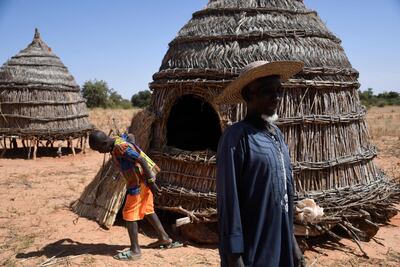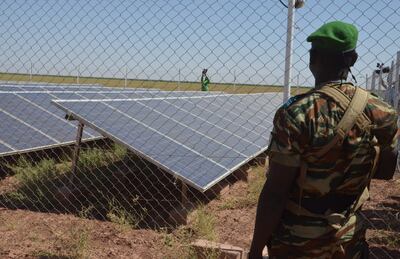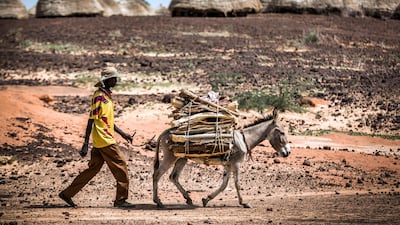Niger’s new junta may be days away from facing an intervention force from its neighbours, as the Economic Community of West African States, or Ecowas, backed by France and other western nations, seeks to restore Niger’s ousted President, Mohamed Bazoum.
International coverage of the July 26 coup has been dominated by images of anti-France demonstrators on the streets waving Russian flags. Missed in the media frenzy is the fact that Niger is in the grips of the worst food crisis it has witnessed in decades, with one in five Nigeriens facing acute food insecurity. No intervention to restore Niger’s fragile constitutional order will succeed for long without addressing the fragile state of Niger’s food supply. Instead, a strategic intervention to enable Niger to feed itself is required as food security is fundamental to securing peace and stability in the country.
Mr Bazoum’s removal from power, if it lasts, will prove a crucial turning point for Niger and the Sahel, a region that has witnessed a succession of military coups, including in neighbouring Burkina Faso and Mali. In succeeding his democratically elected predecessor through the ballot box in Niger’s 2020-2021 elections, Mr Bazoum’s presidency marked the first democratic transition of power in Niger since its independence in 1960.
Mr Bazoum is publicly committed to fighting the extremist insurgency of ISIS and other militants that plague the Niger-Mali-Burkina Faso border regions, for which his government was receiving French, American and Turkish military support. The now-detained president also promised to cure the country’s rampant poverty by increasing Niger’s agri-food production.
The largest landlocked nation in West Africa, Niger faces many challenges in developing the capacity to feeds its population of more than 26 million people. At the core of this food insecurity is the negative impact of climate change on the relationship between Niger’s food and water.
Located directly south of Algeria and Libya, the Sahara covers more than 80 per cent of Niger’s territory. Much of the remaining land is subject to desertification, a process that is being accelerated by global warming. Temperatures in Niger are rising 1.5 times faster than in the rest of the world. Heat stress and increasingly prolonged droughts are degrading the soil in the 14 per cent of the country that contains arable land.

With only 56 per cent of the population having access to safe drinking water, Niger’s farmers have difficulty finding enough for their crops. The crisis in Niger’s food-water relationship has generated increasingly frequent conflicts over water access between herders and farmers, resulting in further reductions Niger’s agricultural output and rising violence and instability.
Climate-driven delays in the rainy season and cycles of long droughts have taken their toll on the country’s meagre agricultural production. According to the Red Cross, during the 2021-2022 cropping seasons, Niger’s production of cereal output plummeted 39 per cent. Cereal production totaled 2.95 million tonnes – 2 million tonnes short of the 4.95 million needed by the population. The consequence was that 44 per cent of Niger’s children suffer from severely acute malnutrition and about five million face food insecurity.
Despite better rainfall this year, which is still far below the average of the previous decade, most regions of Niger are in a state of acute food insecurity, with the regions bordering Burkina Faso and Mali facing a severe food crisis. The supply of cereal grains remains below average and farmers’ stocks are depleted. Armed conflict in Niger’s border regions has reduced output for both herders and farmers. Between water scarcity and physical insecurity, the area sown or harvested in Niger has fallen 15 to 30 per cent, according to the Famine Early Warning Systems Network. The network reports that prices for key grains like maize and millet in the markets of regions such as Agadez, Diffa, Maradi, Tillabery and Zinder are reported to have risen between 15 and 20 per cent.
The physical insecurity caused by extremist groups is another factor in the equation. Insecurity on the main roads in the three-country border region has cut cereal grain flows to Niger from Burkina Faso and Mali by 90 to 95 per cent. Beyond the Sahel, the Russia-Ukraine war has been adding to the toll. The flow of wheat flour, cooking oil and other staple food items from the Black Sea region transported through Algeria has been disrupted by an estimated 50 to 60 per cent. Similarly, the rise in international oil prices has made transportation costs more prohibitive, further cutting imports from neighbouring countries as well as reducing the amount of foodstuffs the Nigerien government can purchase for public food assistance.
Mr Bazoum prioritised working with the nation’s farmers to improve Niger’s agricultural infrastructure. Despite highlighting the need to the international community for solutions to resolve Niger’s food-water dilemma, the President’s appeal for financial assistance to develop irrigation systems and other infrastructure has largely fallen on deaf ears. Although western governments have placed a co-ordinated strategic focus on providing military assistance to address the security threats posed by insurgents, there is no comparable focus on providing technical and financial assistance to the agricultural sector.
According to US government data, Niger’s agricultural sector employs 85 per cent of the population and accounts for about half of the country’s GDP. Enabling Niger’s farmers to use modern drip irrigation, for example, would reduce water consumption by as much as 60 per cent while producing a 30 to 90 per cent increase in crop yields.

Costing about $1,200 per hectare at the low end, according to the Middle East Institute, basic drip irrigation systems are simply beyond the means of Niger’s small-scale farmers. Even a little aid, strategically applied could go a long way. One pilot irrigation project that reached about 900 farmers, resulted in yield increases up to 82 per cent, with farmers able to grow rainy-season crops during the dry season. The successful project was funded by a $1.5 million loan that provided drip irrigation technology to farmers though private sector and concessional financing.
Over the past decade, the US has provided Niger with more than $500 million in military assistance and training programmes. In 2023, the EU inaugurated a $30 million military training mission in Niger. In addition to military aid, western powers have contributed substantial development assistance to Niger for a variety of purposes. The EU has allotted $554 million for assistance to Niger during the 2021-2024 period for education, sustainable growth and governance. In 2022, France’s own development to Niger amounted to $130 million while US aid totalled $101 million. However, unlike fighting extremists, there seems to have been little strategic co-ordination in addressing water scarcity and food production.
Events have been moving quickly since Ecowas leaders issued their one-week ultimatum to Niger’s junta to restore Mr Bazoum to power or face the consequences, including the use of force. The next day, planes sent by France landed in Niamey to evacuate French and EU citizens, clearing the way for an intervention. On Wednesday, the chiefs of defence of the Ecowas nations began a two-day summit in Nigeria, indicating that some form of intervention may be imminent.
When it comes to foreign interventions in sub-Saharan Africa, past often serves as prologue. The narrow focus of military interventions to restore the security of the political order without achieving food security has proven short-sighted. The persistence of extremely fragile food systems, such as in Niger, simply reset the conditions of instability for the next round of crisis. As Ecowas and its international partners contemplate their next moves, strategic thinking needs to shift beyond bombs to bread. Niger’s food crisis is what requires international intervention.
Prof Michael Tanchum would like to thank Vicky Andarcia for her research assistance


